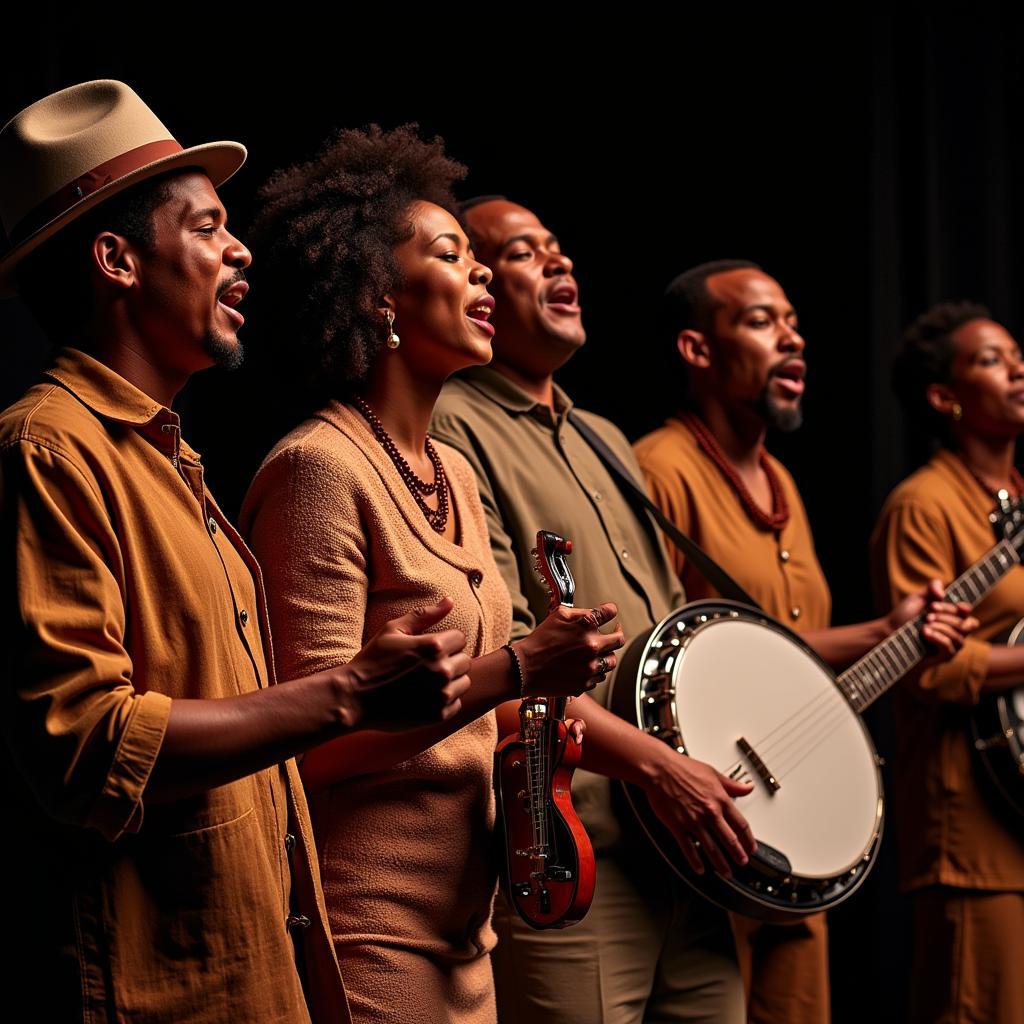Unveiling the Power of African American Folk Songs Lyrics
African American Folk Songs Lyrics offer a poignant and powerful window into the history, struggles, and triumphs of Black people in America. More than just musical expressions, these songs served as tools of resistance, resilience, and cultural preservation, carrying within their verses the echoes of a people’s journey through oppression, liberation, and the ongoing pursuit of equality.
 Group of African American folk singers performing
Group of African American folk singers performing
The Roots of Resilience: Tracing Back African American Folk Songs
African American folk songs, with their roots firmly planted in the soil of slavery and segregation, emerged as a powerful form of communication and expression for a community denied basic human rights. These songs, often passed down orally through generations, served as:
- Chronicles of hardship: They documented the brutal realities of slavery, forced labor, and the daily indignities endured under Jim Crow.
- Vehicles of hope: Despite their somber origins, the songs often carried messages of hope, faith, and the belief in a brighter future.
- Tools of resistance: Coded messages within the lyrics often spoke of escape, rebellion, and the yearning for freedom.
This rich musical heritage, deeply intertwined with the African oral tradition, provided solace, strength, and a sense of collective identity during some of the darkest chapters in American history.
Deciphering the Lyrics: Themes and Symbolism in African American Folk Songs
To truly appreciate African American folk songs, one must delve beyond the surface beauty of the melodies and into the profound layers of meaning embedded within the lyrics. Common themes include:
- Longing for freedom: Songs like “Swing Low, Sweet Chariot” and “Go Down Moses” utilized biblical allegory to express the yearning for liberation from slavery.
- Everyday life and labor: Work songs, such as “Hammer Ring”, provided rhythm for strenuous tasks and often contained subtle critiques of the oppressive conditions faced by Black laborers.
- Love, loss, and family: Despite the hardships they faced, African Americans found solace in love, family, and community, themes often reflected in their music.
- Protest and social commentary: As the Civil Rights Movement gained momentum, folk songs evolved to reflect the struggle for equality and justice.
The Enduring Legacy of African American Folk Music
The impact of African American folk songs extends far beyond the fields and plantations where they were born. These songs have left an indelible mark on American music and culture, influencing:
- The Blues: The raw emotion and themes of hardship found in folk songs laid the groundwork for the development of the blues.
- Gospel music: The spirituals born out of slavery evolved into gospel music, a genre that continues to provide solace and inspiration.
- Protest music: The tradition of using music to challenge injustice, deeply rooted in African American folk songs, resonated throughout the Civil Rights Movement and continues to inspire activists today.
Exploring the Lyrics: Where to Begin
Interested in delving deeper into the rich tapestry of African American folk songs lyrics? Here are some excellent resources:
- African American music history: This comprehensive guide provides a detailed overview of the evolution of Black music in America, from its roots in Africa to its modern-day expressions.
- African folk songs: This article explores the diverse world of African folk music, highlighting the cultural significance and enduring legacy of these powerful songs.
By immersing yourself in the stories woven within these lyrics, you’ll gain a deeper understanding of the African American experience and the power of music as a tool for social change, cultural preservation, and the enduring human spirit.
Conclusion: A Timeless Tapestry of Music and History
African American folk songs lyrics offer a profound and moving testament to the resilience, creativity, and enduring spirit of Black people. These songs, born out of struggle and hope, continue to resonate with audiences today, reminding us of the power of music to transcend time, bridge cultural divides, and inspire us to strive for a more just and equitable world.

